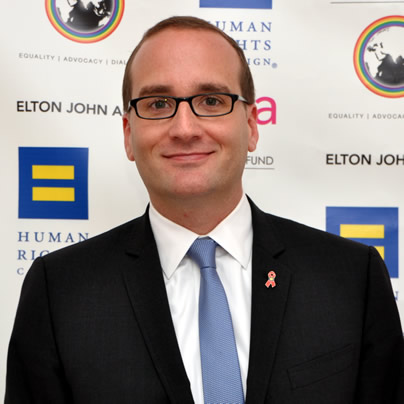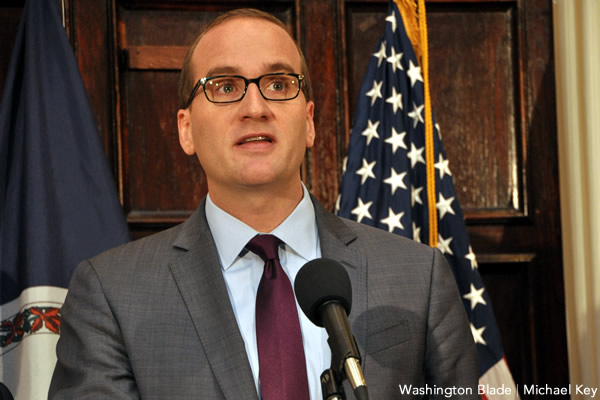News
HRC urges feds to recognize Utah same-sex marriages
Griffin says ‘no legal reason’ to question the validity of 1,300 unions


Human Rights Campaign President Chad Griffin is calling on the Obama administration to recognize Utah same-sex marriages. (Washington Blade photo by Michael Key)
The nation’s largest LGBT organization is formally calling on the Obama administration to recognize as valid the estimated 1,300 same-sex marriages performed in Utah.
In a letter dated Jan. 9 and obtained by the Washington Blade, Chad Griffin, president of the Human Rights Campaign, writes to U.S. Attorney General Eric Holder “there is no legal reason to question” the validity of same-sex marriages performed in the state before the Supreme Court issued a stay on the weddings.
“Given this landscape of facts, there is simply no reason for the United States government not to extend federal recognition to these more than 1,300 couples,” Griffin writes.
Griffin ticks off several reasons why the marriages should be considered valid — despite a recent decision from Utah Gov. Gary Herbert to hold off on recognizing Utah same-sex marriages until the litigation that enabled them is complete.
“Each was legally performed by a clerk representing the State of Utah, in accordance with the state’s statutes and constitution,” Griffin writes. “Even the office of the governor of Utah—whose formal political position is one of opposition to marriage equality—urged state agencies to extend state marriage recognition to these couples during that 20 day period when same-sex marriages were being performed. Even though the governor’s office has now made a political decision to cut off this recognition, it continues to insist that it makes no pronouncement about the validity of these unions.”
A Justice Department spokesperson confirmed receipt of the letter, but declined further comment. Earlier this week, Dena Iverson, a Justice Department spokesperson, said the department is reviewing the Utah governor’s as part of its determination on whether the federal government will recognize the unions.
Same-sex couples began marrying in Utah on Dec. 20 as a result of ruling from U.S. District Judge Robert Shelby striking down the state’s ban on same-sex marriage, known as Amendment 3, as unconstitutional. However, the Supreme Court placed a stay on these marriages on Monday, resulting in Utah saying it would place on hold recognition of these unions until the litigation is resolved in the courts.
But the letter to Holder isn’t the only missive HRC sent out on Thursday. The organization also sent out a letter to each of the attorneys general in the 18 states where same-sex marriage is recognized to urge them to recognize the Utah same-sex unions.
“Should any of these couples be residents of, travel through, or relocate to your state, there is simply no reason to treat their marriage differently from any other, and I urge you to issue an advisory opinion declaring that treating all legally-conferred marriages consistently as a matter of equal protection and basic justice is consistent with the public policy of your state,” Griffin writes.
Notably, D.C. isn’t included in the letter, even though same-sex marriage was legalized there in 2009.
According to Utah TV affiliate Fox 13, Utah Attorney General Sean Reyes suggested that others states may be able to recognize same-sex marriages performed in Utah, even though Utah won’t recognize them.
“It’s not invalidating it in the same way that if they went to Hawaii, they could potentially apply for benefits there based on the marriage that took place. They can’t be recognized (here),” Reyes reportedly said. “There is a very fine distinction, but a very important distinction based on those two things.”
Kansas
ACLU sues Kansas over law invalidating trans residents’ IDs
A new Kansas bill requires transgender residents to have their driver’s licenses reflect their sex assigned at birth, invalidating current licenses.

Transgender people across Kansas received letters in the mail on Wednesday demanding the immediate surrender of their driver’s licenses following passage of one of the harshest transgender bathroom bans in the nation. Now the American Civil Liberties Union is filing a lawsuit to block the ban and protect transgender residents from what advocates describe as “sweeping” and “punitive” consequences.
Independent journalist Erin Reed broke the story Wednesday after lawmakers approved House Substitute for Senate Bill 244. In her reporting, Reed included a photo of the letter sent to transgender Kansans, requiring them to obtain a driver’s license that reflects their sex assigned at birth rather than the gender with which they identify.
According to the reporting, transgender Kansans must surrender their driver’s licenses and that their current credentials — regardless of expiration date — will be considered invalid upon the law’s publication. The move effectively nullifies previously issued identification documents, creating immediate uncertainty for those impacted.
House Substitute for Senate Bill 244 also stipulates that any transgender person caught driving without a valid license could face a class B misdemeanor, punishable by up to six months in jail and a $1,000 fine. That potential penalty adds a criminal dimension to what began as an administrative action. It also compounds the legal risks for transgender Kansans, as the state already requires county jails to house inmates according to sex assigned at birth — a policy that advocates say can place transgender detainees at heightened risk.
Beyond identification issues, SB 244 not only bans transgender people from using restrooms that match their gender identity in government buildings — including libraries, courthouses, state parks, hospitals, and interstate rest stops — with the possibility for criminal penalties, but also allows for what critics have described as a “bathroom bounty hunter” provision. The measure permits anyone who encounters a transgender person in a restroom — including potentially in private businesses — to sue them for large sums of money, dramatically expanding the scope of enforcement beyond government authorities.
The lawsuit challenging SB 244 was filed today in the District Court of Douglas County on behalf of anonymous plaintiffs Daniel Doe and Matthew Moe by the American Civil Liberties Union, the ACLU of Kansas, and Ballard Spahr LLP. The complaint argues that SB 244 violates the Kansas Constitution’s protections for personal autonomy, privacy, equality under the law, due process, and freedom of speech.
Additionally, the American Civil Liberties Union filed a temporary restraining order on behalf of the anonymous plaintiffs, arguing that the order — followed by a temporary injunction — is necessary to prevent the “irreparable harm” that would result from SB 244.
State Rep. Abi Boatman, a Wichita Democrat and the only transgender member of the Kansas Legislature, told the Kansas City Star on Wednesday that “persecution is the point.”
“This legislation is a direct attack on the dignity and humanity of transgender Kansans,” said Monica Bennett, legal director of the ACLU of Kansas. “It undermines our state’s strong constitutional protections against government overreach and persecution.”
“SB 244 is a cruel and craven threat to public safety all in the name of fostering fear, division, and paranoia,” said Harper Seldin, senior staff attorney for the ACLU’s LGBTQ & HIV Rights Project. “The invalidation of state-issued IDs threatens to out transgender people against their will every time they apply for a job, rent an apartment, or interact with police. Taken as a whole, SB 244 is a transparent attempt to deny transgender people autonomy over their own identities and push them out of public life altogether.”
“SB 244 presents a state-sanctioned attack on transgender people aimed at silencing, dehumanizing, and alienating Kansans whose gender identity does not conform to the state legislature’s preferences,” said Heather St. Clair, a Ballard Spahr litigator working on the case. “Ballard Spahr is committed to standing with the ACLU and the plaintiffs in fighting on behalf of transgender Kansans for a remedy against the injustices presented by SB 244, and is dedicated to protecting the constitutional rights jeopardized by this new law.”
National
After layoffs at Advocate, parent company acquires ‘Them’ from Conde Nast
Top editorial staff let go last week

Former staff members at the Advocate and Out magazines revealed that parent company Equalpride laid off a number of employees late last week.
Those let go included Advocate editor-in-chief Alex Cooper, Pride.com editor-in-chief Rachel Shatto, brand partnerships manager Erin Manley, community editor Marie-Adélina de la Ferriére, and Out magazine staff writers Moises Mendez and Bernardo Sim, according to a report in Hollywood Reporter.
Cooper, who joined the company in 2021, posted to social media that, “Few people have had the privilege of leading this legendary LGBTQ+ news outlet, and I’m deeply honored to have been one of them. To my team: thank you for the last four years. You’ve been the best. For those also affected today, please let me know how I can support you.”
The Advocate’s PR firm when reached by the Blade said it no longer represents the company. Emails to the Advocate went unanswered.
Equalpride on Friday announced it acquired “Them,” a digital LGBTQ outlet founded in 2017 by Conde Nast.
“Equalpride exists to elevate, celebrate and protect LGBTQ+ storytelling at scale,” Equalpride CEO Mark Berryhill said according to Hollywood Reporter. “By combining the strengths of our brands with this respected digital platform, we’re creating a unified ecosystem that delivers even more impact for our audiences, advertisers, and community partners.”
It’s not clear if “Them” staff would take over editorial responsibilities for the Advocate and Out.

In an official statement released at the reveal event Capital Pride Alliance described its just announced 2026 Pride theme of “Exist, Resist, Have the Audacity” as a “bold declaration affirming the presence, resilience, and courage of LGBTQ+ people around the world.”
The statement adds, “Grounded in the undeniable truth that our existence is not up for debate, this year’s theme calls on the community to live loudly and proudly, stand firm against injustice and erasure, and embody the collective strength that has always defined the LGBTQ+ community.”
In a reference to the impact of the hostile political climate, the statement says, “In a time when LGBTQ+ rights and history continue to face challenges, especially in our Nation’s Capital, where policy and public discourse shape the future of our country, together, we must ensure that our voices are visible, heard, and unapologetically centered.”
The statement also quotes Capital Pride Alliance CEO and President Ryan Bos’s message at the Reveal event: “This year’s theme is both a declaration and a demand,” Bos said. “Exist, Resist, Have Audacity! reflects the resilience of our community and our responsibility to protect the progress we’ve made. As we look toward our nation’s 250th anniversary, we affirm that LGBTQ+ people have always been and always will be part of the United States’s history, and we will continue shaping its future with strength and resolve,” he concluded.


















